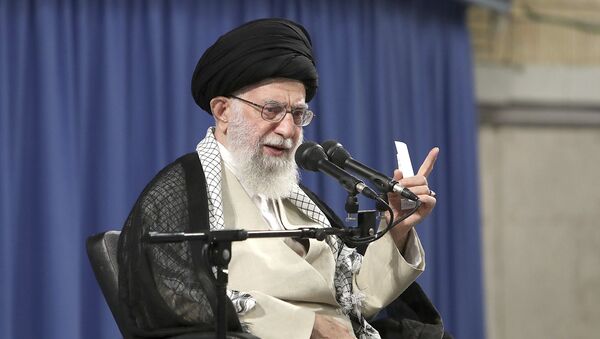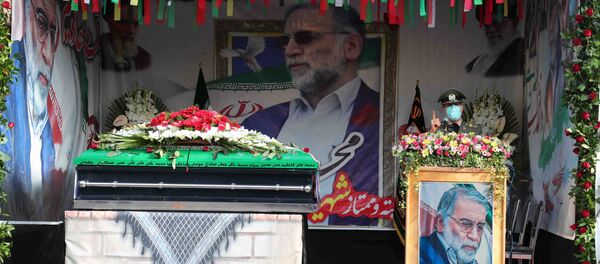Iranian Supreme Leader Ayatollah Ali Khamenei’s health is deteriorating and he has transferred power over to his 51-year-old son Mojtaba Khamenei, a theological scholar and Iran-Iraq War veteran, Newsweek has reported, citing self-described ‘Iranian journalist Mohamad Ahwaze’ on Twitter.
“Iranian President Hassan Rouhani was scheduled to meet on Friday with the Iranian Leader Khamenei, this meeting between [Khamenei] and President Rouhani was canceled due to the deterioration of Khamenei’s health condition,” Ahwaze, a self-proclaimed journalist ‘writing about inside Iran and its environs’, was quoted as saying in an Arabic language tweet.
Newsweek said it could not independently confirm or verify Ahwaze’s claims, and mistakenly spelled his first name ‘Momahad’ instead of ‘Mohamad’.
The journalist himself cited unnamed “sources” in Iran who he said have been talking about Khamenei’s health condition.
“Iranian sources confirm that the duties and powers of the office of Supreme Leader Khamenei have been transferred to his son Mojtaba Khamenei, who oversees several security and intelligence departments in Iran,” he tweeted in a follow-up tweet.
2- تؤكد المصادر الإيرانية بأن مهام وصلاحيات مكتب المرشد خامنئي أنتقلت إلى نجله مجتبى خامنئي الذي يشرف على عدة دوائر أمنية وإستخباراتية في إيران .
— M.Majed محمد مجيد (@MohamadAhwaze) December 5, 2020
( صورة مجتبى خامنئي مع سلمياني ) pic.twitter.com/JVDLC4Y3mB
Ahwaze also noted that the cause of Khamenei’s alleged poor health was not clear, but possibly related to prostate cancer.
In addition to Newsweek, the journalist’s claims were picked up by the Jerusalem Post, as well as at least one UK tabloid (who similarly spelled Ahwaze’s name wrong).
This isn’t the first time that Ahwaze’s reporting has been picked up by major Western outlets. Last week, Ahwaze distributed images of four men he said were suspects for the assassination of senior Iranian nuclear and missile scientist Mohsen Fakhrizadeh, with his reporting picked up by Israeli media, including The Times of Israel. The newspaper later indicated that the journalist appeared to be the source of unverified claims about a 62-man hit squad claimed to have been involved in the killing.
'Garbage' Fake News
Iran watchers online dismissed the Twitter journalist’s claims, and blasted US and Middle Eastern media for repeating his reporting, which they called “nonsense” and “fake news”.
“Garbage. This is why Western media has no credibility. It’s like their wishful thinking that Iran will give up its missile defence capability and its support for allies in the fight against terrorism and apartheid. Newsweek is just one example of a discredited establishment media,” Seyed Mohammad Marandi, a professor of English literature at the University of Tehran, wrote.
Garbage.
— Seyed Mohammad Marandi (@s_m_marandi) December 5, 2020
This is why western media has no credibility.
It's like their wishful thinking that Iran will give up its missile defense capability & its support for allies in the fight against terrorism & apartheid.
Newsweek is just one example of a discredited establishment media. https://t.co/QbAQIVqRCY
Others expressed similar concerns over the unverified reporting, recalling similar false narratives regarding the ‘death’ of North Korean leader Kim Jong-un, or suggesting Newsweek and others did not even have “the slightest idea” how the Iranian system of power works.
I love how they had to add this qualification to the story lol pic.twitter.com/ppHHMXXCca
— keyvan (کیوان) (@islamphobiacow) December 5, 2020
Apparently they don't have the slightest idea on how the Iranian system works
— GAZALI SHANI (@gazali_shani) December 5, 2020
Under Iran’s constitution, the supreme leader is formally elected and watched over by the Assembly of Experts, a deliberative body whose members are vetted by the Guardian Council, a 12-member body of jurists and experts in Islamic law charged with interpreting the constitution, supervising elections, and approving candidates for president and the Islamic Consultative Assembly. Theoretically, Khamenei's successor would be chosen by the Assembly of Experts, and not by the supreme leader himself.
Khamenei’s last English-language tweets were published on November 28, and were related to Fakhrizadeh’s killing. The supreme leader asked Iran’s security services to “investigate this crime and firmly prosecute its perpetrators and its commanders”. Unlike Rouhani and Zarif, he did not directly mention Israel in his remarks.
All relevant administrators must seriously place two crucial matters on their agendas: 1st to investigate this crime and firmly prosecute its perpetrators and its commanders, 2nd to continue the martyr’s scientific and technological efforts in all the sectors where he was active.
— Khamenei.ir (@khamenei_ir) November 28, 2020





